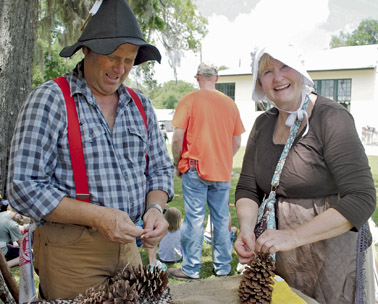ARCHER – A $650,000 grant for a sewer system in the City of Archer was spared earlier this month from Florida Governor Rick Scott's promise to veto more than $250 million from the State Legislature's 2016 budget, according to former city commissioner Doug Jones.
Archer has accumulated a total of $1.4 million in legislative grants for the project, thanks in part to State Senator Rob Bradley, who was instrumental in getting $750,000 in 2014, Jones said.
“Those kinds of things at the state level don’t happen unless you’ve got strong support from your delegation,” Jones said.
Citizens of Archer are presently relying on septic tank systems for the disposal of wastewater.
Zeriah Folston, Archer’s City Manager, said a lack of proper upkeep for these septic tanks has left some in poor condition.
State Representative Keith Perry said he took a tour of some of the areas in Archer where the septic tanks were not functioning correctly after he was contacted by the city commission.
While Archer is not in his district, Perry said he is familiar with the town as his father lived there for years.
Perry said that while septic tanks can be fixed, his greatest concerns were in regard to Archer’s economic limitations without a wastewater system.
“If desired, they could have businesses that could locate there… Or new restaurants could open,” he said. “You can’t build a business first, [you have to] build the infrastructure first.”
He said some of the next steps to advance the project include environmental studies and making sure that the sites they’ve chosen are suitable.
“So, then it’s really up to the City of Archer as far as the direction they want to go,” he said. “But once this is fully in place, it certainly wouldn’t be limited.”
Another concern for the citizens of Archer would be the financial implications of such a project, potentially leading to increased local taxes.
However, Folston said he believes that the State’s commitment to the project will make it reasonable for residents.
“The State [partnering] with us was a huge step in terms of helping us make things affordable,” he said. “We have a resilient group of people…. My board’s desire is to make it more affordable, and securing partnerships like the one we had with the State is [going to] help us do that.”
Folston said the next phase will include designing how the sewer system will look and how to ensure that it’s environmentally friendly.
The City is collaborating with Debra Preble, the vice president of Preble-Rish Inc. Consulting Engineers out of Tallahassee, to work on a preliminary engineering report for the sewer system. There is no specific date for completion of the report at this time, Folston said.
“Archer intends to use some of the most advanced wastewater treatment technology that is available, including infiltrating wetlands for affluent disposal and aquifer recharge,” Folston said.
The effects of wastewater expansion and the responsible growth that a City can enjoy were evident during his time working with the City of Alachua, Folston said.
He said he has the same vision for Archer a few years down the road.
# # #
Email Korrego@
alachuatoday.com




 RAINA BARNETT/Alachua County Today
RAINA BARNETT/Alachua County Today